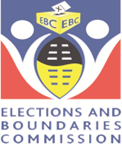The Election Process
The Elections and Boundaries Commission is mandated by sections 90 to 92 of the Constitution of Eswatini to manage the country’s elections. This mandate speaks to a number of process, activities and programmes undertaken in preparation for a General election. The processes are based on the election cycle – pre- election, election and post.
The boundaries of each Inkhundla shall be such that the number of inhabitants in an Inkhundla is as nearly equal to the population quota as is reasonably
practicable having regard to the terrain, the means of communication (transport) within that Inkhundla and any other relevant community interest.
The Commission shall review the number and boundaries of tinkhundla. Each inkhundla shall have the number of inhabitants of an inkhundla as nearly equal to the population quota as reasonably practice.
The Commission shall as soon as practicable after every election produce and submit a report on that election to the minister responsible for elections, stating –
(a) the general conduct of the elections and the number of voters who participated;
(b) any irregularities or abnormalities observed;
(d) whether any nomination or election was disputed and with what result;
(e) any observed or remarkable peculiarities;
(f) recommendations, if any.
The report shall be made nine (9) months before the dissolution of parliament.
Civic Education entails the provision of information to empower citizens to participate in democratic processes. It provides awareness of the environment in which elections take place. It includes the democratic system of government, good governance, electoral system, etc..
Voter education entails awareness of voter rights, understanding of the electoral system. It gives an insight into the electoral processes and can also provide dates of the activities.
This stage of the election process allows for the registration of voters for purposes of electing Members of Parliament, Constituency Headman (Indvuna), and Inkhundla Executive Member (Bucopho). The registration process takes place at the chiefdoms and other designated places and the dates for the registration are announced by the Commission. All along, we have been using the once off registration system. We are now working towards adopting the continuous voter registration system.
On the day of registration, the voter must bring some form of identification. In the event he or she does not have one, he or she may still register in the presence of the Competent Witnesses as defined in the Voter Registration Act.
The Commission is using the Optimal Mark Recognition (OMR) System. Under it, the voter is identified by means of an identity card, a photograph, and a thumbprint.
After completion of the registration process, a preliminary voter’s register is produced and sent to the respective chiefdoms for validation. The validation of the voter’s roll is an important stage in the electoral process under the Voter Registration Act of 2013. Registered voters are given an opportunity to verify their details and also to confirm that they are correctly placed in the particular polling station they wish to vote at. This process urges all voters to visit their chiefdoms where a copy of the voter’s register is kept for a specific period of time.
Nomination is an act of suggesting or choosing somebody as a candidate in an election, and is conducted in accordance with the Constitution which designates chiefdoms as nomination centres. Dates for the nominations are proclaimed in a gazette. A Chiefdom is then expected to nominate candidates in the following elective offices
• Bucopho,
• Indvuna YeNkhundla and
• Member of Parliament
After the nomination process, the Commission produces ballot papers for the nominated candidates per elective office per chiefdom. The ballot paper is peculiar to that specific chiefdom. Date and time (0700hrs- 1700hrs) of the election is stipulated in the Writ signed by His Majesty the King. At the primary level, chiefdoms are given an opportunity to elect candidates in all the three elective offices. The elective offices contested for at this level are those of Bucopho, Indvuna ye Nkhundla and the Member of Parliament. The election of Bucopho is finalized at this stage. At primary level there is no canvassing for votes as candidates are nominated (that is, invited to serve) on the basis of their being known to that community.
Electoral campaigning is the process by which a candidate seeks electoral support a bid to win a political office. It is organized by the Elections Management Body (EMB) and is also conducted independently by each candidate. The campaigning is prescribed by the Electoral laws of the country and is monitored by the elections stakeholders. It is done immediately after primary elections up to the day before secondary elections.
The secondary election process covers ballot paper production, the poll, and the declaration of results. All the candidates who qualify in the primary elections in the position of Indvuna ye Inkhundla and Member of Parliament must have their names and photographs in the secondary elections ballot paper. Unlike the primary elections, the ballot paper at this stage is common to all the chiefdoms in that specific constituency for each of the elective offices. The Election procedure is the same as that of the Primary election. However, during the Secondary Election the time of poll is from 07:00hrs to 18:00 hrs.
By election is a special election that is held between regular elections to replace someone who has died, resigned or left the office for various reasons. During by elections, procedures and processes are the same as those of general election. No new registration takes place during this election.
Whenever a vacancy occurs in the membership of the House of Assembly the Clerk, in the case of an elected member, or in the case of the Indvuna yeNkhundla and the Bucopho the Ministry responsible for Tinkhundla or Bucopho administration, shall notify the Commission in writing within seven days after the vacancy has occurred, and a by-election shall be held within a reasonable period.
